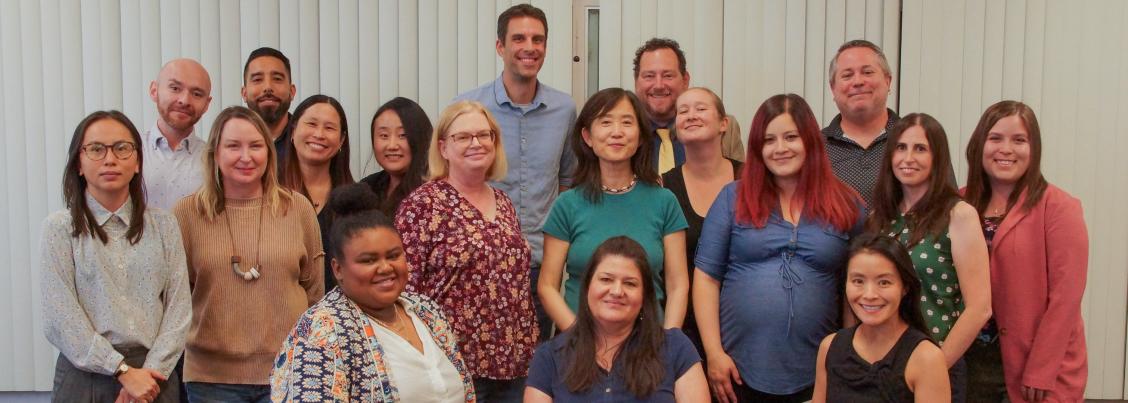
Biography
Education
- Ph.D. 1998, State University of New York, Binghanton (Clinical Psychology)
- M.A. 1991, California State University, Fresno (Psychology)
- B.S. 1989, University of California, Davis (Psychology)
Specialty Areas: Social functioning in schizophrenia, Social cognition, Neurocognition and Psychosocial rehabilitation.
Courses Taught
- PSY 250 - Physiological Correlates of Human Behavior
- PSY 306 - Health Psychology
- PSY 310 - Behavior Disorders
- PSY 497 - Professional Seminar in Psychological Research
- PSY 625Dw/Lab - Child/Adolescent Psychological Assessment & Lab
Selected Publications and Presentations
Wirshing, D. A., Sergi, M. J., & Mintz, J. (In Press). A videotape intervention to enhance the informed consent process for medical and psychiatric treatment research. American Journal of Psychiatry.
Sergi, M. J., Kern, R. S., Mintz, J., & Green, M. F. (In Press). Learning potential and the prediction of work skill acquisition in schizophrenia. Schizophrenia Bulletin.
Green, M. F., Kern, R. S., & Sergi, M. J. (In Press). An introduction to neurocognitive dysfunction in schizophrenia: Why should we care? In R.F.E. Keefe (Ed.), Improving cognitive function in the schizophrenic patient (2nd ed.). London, UK: Science Press.
Sergi, M. J., & Green, M. F. (2003). Social perception and early visual processing in schizophrenia. Schizophrenia Research, 59, 233-241.
Green, M. F., Sergi, M. J., & Kern, R. S. (2003). The laterality of schizophrenia. In K. Hugdal & R. J. Davidson (Eds.), The Asymmetrical Brain (pp. 743-772). Cambridge, MA: MIT Press.
Green, M. F., Kern, R. S., Robertson, M. J., Sergi, M. J., & Kee, K. S. (2000). Relevance of neurocognitive deficits for functional outcome in schizophrenia. In T. Sharma & P. Harvey (Eds.), Cognition in schizophrenia (pp. 178-192). New York: Oxford Press.
Green, M. F., Kern, R. S., & Sergi, M. J. (1999). An introduction to neurocognitive dysfunction in schizophrenia: Why should we care? In R.F.E. Keefe (Ed.), Improving cognitive function in the schizophrenic patient (pp. 1-11). London, UK: Science Press.Manuscripts Under Review
Wynn, J. K, Sergi, M. J., Dawson, M. E., Schell, A. M., & Green, M. F. (Under Review). Sensorimotor gating and social perception in schizophrenia. Schizophrenia Research.
Presentations at Professional Meetings
(Italics indicates CSUN students)Borghei, S., Hatch, L., Maslich, A., Gross, S., Anguiano, Y., Jahchan, C., Mikahaiel, D., Zenta, Y., & Sergi, M. J. (2004). Relationship perception in schizophrenia. Presented at the 2004 Western Psychological Association Annual Convention, Phoenix, AZ.
Time, T., Sarkissian, V., Aguilera, R., Dasgupta, N., Kamitsubo, M., Mahseredjian, P., Njoku, C., Pangilnan, A., Rosenberg, R., & Sergi, M. J. (2004). Undergraduate’s knowledge of their rights as research participants: What do they know and what can they learn? Presented at the 2004 Western Psychological Association Annual Convention, Phoenix, AZ.
Wynn, J. K., Sergi, M. J., & Green, M. F. (2003). Sensorimotor gating and social perception in schizophrenia.Presented at the 2003 Society for Research in Psychopathology Annual Convention, Toronto, ON, Canada.
Bergstrom, R., Levesque, J., Holst, M., Adler, A., White, B., Wozniak, J., & Sergi, M. J. (2003). A new measure of relationship perception: Psychometrics and social functioning. Presented at the 2003 Western Psychological Association Annual Convention, Vancouver, British Columbia, Canada.
Borghei, S., Cave, B., Gonzalez, R., Mahseredjian, P., Jahangard, S., Perron, N., Reyes, D., & Sergi, M. J. (2003). Social perception and neurocognition in persons with dementia. Presented at the 2003 Western Psychological Association Annual Convention, Vancouver, British Columbia, Canada.
Sergi, M. J., Kern, R. S., Mintz, J., & Green, M. F. (2003). Learning potential and the prediction of work skill acquisition in schizophrenia Presented at the International Congress on Schizophrenia Research Annual Convention, Colorado Springs, CO.
Sergi, M. J., Kern, R.S., & Green, M. F. (2002). Learning potential as an intervening factor in psychiatric rehabilitation. Presented at the Association for the Advancement of Behavior Therapy Annual Convention, Reno, NV.
Sergi, M. J., Hong-Deng, B., & Green, M. F. (2002). Extending the assessment of social perception in schizophrenia: New measures, new concepts. Presented at the Society for Research in Psychopathology Annual Convention, San Francisco, CA.
Adlum, K., Coplan, F., Shoshani, N., Adler, A., & Sergi, M. J. (2002). Enhancing the informed consent process through videotape-based instruction. Presented at the Western Psychological Association Annual Convention, Irvine, CA.
Andres, S., Duranso, D., Adlum, K., Davis, B., & Sergi, M. J. (2002). Relations between social cognition and neurocognition. Presented at the Western Psychological Association Annual Convention, Irvine, CA.
Duranso, D., Andres, S., Coplan, F., Davis, B., & Sergi, M. J. (2002). Social perception in elders with and without dementia. Presented at the Western Psychological Association Annual Convention, Irvine, CA.
Sergi, M. J., Knez, D., Kang, C., Fish, S., Hong-Deng, B., & Green, M. F. (2002). Social perception and early visual processing in schizophrenia. Presented at the Western Psychological Association Annual Convention, Irvine, CA.
Sergi, M. J., & Green, M. F. (2001). Assessing social perception in schizophrenia with the
Interpersonal Perception Task – 15. Presented at the Association for the Advancement of Behavior Therapy Annual Convention, Philadelphia, PA.Sergi, M. J., Tidwell, A., Kern, R.S., & Green, M.F. (2001). Learning potential as a predictor of rehabilitation success in persons with schizophrenia. Presented at the Society for Research in Psychopathology Annual Convention, Madison, WI.
Sergi, M. J., & Green, M. F. (2001). Social perception and early visual processing in schizophrenia. Presented at the International Congress of Schizophrenia Research Annual Convention, Whistler, British Columbia, Canada.
Sergi, M. J., Holaway, R., McGee, M., & Green, M. F. (2000). Social perception and early visual processing in schizophrenia: Deficits in integrating multiple social stimuli. Presented at the Society for Research in Psychopathology Annual Convention, Boulder, CO.
Sergi, M. J., & Green, M. F. (1999). Social perception and early visual processing in schizophrenia: Preliminary findings. Presented at the Society for Research in Psychopathology Annual Convention, Montreal, Quebec, Canada.
Research Interests
Areas of Investigation
My primary line of research concerns relations between neurocognition, social cognition, and functional outcome in persons with schizophrenia and related disorders. Persons with schizophrenia experience multiple neurocognitive impairments (e.g., attention, verbal memory) and these deficits influence their level of social functioning, work functioning, and ability to live independently. Social cognitive variables such as social perception, theory of mind, emotion perception, and relationship perception may mediate the relationship between neurocognition and functional outcome in schizophrenia.
I also study neurocognitive predictors of rehabilitation outcome in schizophrenia. The treatment of persons with schizophrenia often involves antipsychotic medication and skills training (psychoeducation courses designed to increase functional skills and reduce the probability of hospitalization). Neurocognitive assessments may determine the type or intensity of psychoeducation needed for clinically significant improvement in functional skills. Our recent study, accepted for publication in Schizophrenia Bulletin, examined the ability of neurocognition-based learning potential assessments to predict the learning of schizophrenia patients in a brief work skill acquisition program. A study currently under development will examine the ability of such assessments to predict sobriety skill acquisition and abstinence in substance-abusing patients with schizophrenia.
A third line of research concerns the enhancement of informed consent procedures. Legal and ethical concerns have produced great interest in informed consent in major mental illness. One study, recently accepted for publication in the American Journal of Psychiatry, for that a videotape-based educational intervention increased informed consent knowledge in psychiatric patients, medical patients, and undergraduates.
Current Projects
“Social Perception and Early Visual Processing in Schizophrenia” (Collaborator: Dr. Michael Green, UCLA): Findings from the first SP-EVP project were published in the February 2003 edition of Schizophrenia Research. We found that social perception in schizophrenia assessed with a videotape-based measure was associated with early visual processing assessed with forward and backward masking procedures. The current SP-EVP study examines these issues in the siblings of persons with schizophrenia as well. At present, approximately 20 siblings, 50 persons with schizophrenia and 30 healthy control persons have been tested. Healthy siblings often have neurocognitive impairments similar to those of their schizophrenic siblings. We expect to find that siblings are impaired in both social perception and early visual processing and that these two variables are associated in the sibling sample.
“Sensorimotor Gating, Orienting, and Social Perception in Schizophrenia” (Collaborators: Drs. Jonathon Wynn and Michael Green, UCLA): A manuscript from this study was submitted to Schizophrenia Research. In a sample of 30 patients with schizophrenia, sensorimotor gating assessed with a pre-pulse inhibition task was associated with social perception assessed with a videotape-based measure. In contrast, orienting assessed with a pre-pulse facilitation task was not related to social perception.
“Effects of Two Atypical Antipsychotic Medications on Social Cognition in Schizophrenia” (Collaborators: Drs. Stephen Marder and Michael Green, UCLA). We are comparing two newer antipsychotic medications -- olanzapine and risperidone – and one conventional antipsychotic medication – haloperidol – in their ability to improve social cognition in schizophrenia. This multi-site project is being conducted at Veterans Affairs Medical Centers in West Los Angeles, Long Beach, and San Diego. Patents complete the social cognitive battery as well as measures of neurocognition and symptom severity at baseline, 4 weeks, and 8 weeks. At present, approximately 50 patients have completed the protocol.
“Relationship Perception in Schizophrenia” (Collaborators: Drs. Alan Fiske and Michael Green, UCLA). This project is supported by the National Institute of Mental Health Translational Research Center titled UCLA Center for Neurocognition and Emotion in Schizophrenia. Translational Research Centers bring together researchers in basic behavioral science and researchers in clinical psychology toward the end of developing novel approaches to clinical issues. Dr. Fiske, Dr. Green, and I have developed a measure of relationship perception – Relationships Across Domains (RAD) -- based on Dr. Fiske’s Relational Models Theory. After many iterations, we have a measure with acceptable internal consistency (alpha = .77 in a sample of 21 outpatients with schizophrenia; alpha = .72 in a sample of 140 CSUN undergraduates). The RAD is currently administered as part of the Center’s large neurocognitive and social cognitive test battery. Samples include persons with chronic schizophrenia, persons with early onset schizophrenia, and persons with prodromal symptoms of schizophrenia.
“Coping and Social Perception in Schizophrenia” (Collaborator: Dr. Joseph Ventura, UCLA). Schizophrenia patients complete measures of recent coping behaviors, social perception, and neurocognition. Data collection at the UCLA Aftercare Clinic and the West Los Angeles Veterans Affairs Medical Center began in June 2003.
“A Videotape Intervention to Enhance Informed Consent in Psychiatric and Medical Research” (Collaborators: Drs. Donna Wirshing and Jim Mintz, UCLA). A manuscript from this study was recently accepted for publication by the American Journal of Psychiatry. Psychiatric patients, medical patients, and CSUN undergraduates completed an assessment of their informed consent knowledge (Assessment of Informed Consent Issues) prior to and immediately after viewing the experimental or control version of the videotape-based intervention. Analyses indicate that the experimental videotape increased informed consent knowledge in all three samples. We are currently conducting an exploratory factor analysis of the Assessment of Informed Consent Issues using a sample of nearly 200 CSUN undergraduates.
“Neurocognitive Predictors of Sobriety Skill Acquisition and Abstinence in Substance-Abusing Patients with Schizophrenia” (Collaborators: Ms. Saba Borghei, CSUN, and Dr. Thad Eckman, UCLA). Dr. Eckman oversees the Dual Diagnosis Treatment Program (DDTP) at the West Los Angeles Veterans Affairs Medical Center. Substance-abusing patients with schizophrenia in the DDTP participate in the psychoeducation program Substance Abuse Management. Prior to each treatment cycle, consenting patients will be administered measures of neurocognition, symptoms, and baseline sobriety knowledge and skills. After treatment, participating patients will again complete the assessment of sobriety knowledge and skills. Three months after treatment onset patients will report on their substance use over the past three months (twice weekly urine toxicology screens will also be employed as a measure of abstinence). This project will hopefully begin during the Fall 2004 term.




